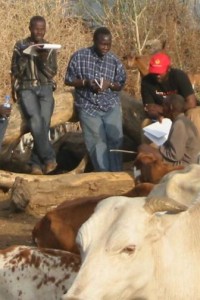Biocultural protocols event in Rome

LPP and the LIFE Network held a side-event during the meeting of the Commission on Genetic Resources for Food and Agriculture on 19 October 2009, entitled Biocultural/Community Protocols and a Code of Conduct on Livestock Keepers’ Rights. The session focused on new tools for strengthening the role of small-scale livestock keepers in the implementation of the Global Plan of Action for Animal Genetic Resources.
This side-event shared insights and results of the LIFE Network’s most recent activities with livestock keeping communities in Africa and South Asia. It included presentations by
Ilse Koehler-Rollefson, League for Pastoral Peoples and Endogenous Livestock Development. Tools for strengthening the role of small-scale livestock keepers in the implementation of the Global Plan of Action for Animal Genetic Resources
Download 1.76 Mb
Raziq Kakar, SAVES (Pakistan): Results of a participatory livestock breed survey in Baluchistan.
Download 3.19 Mb
Elizabeth Katushabe, PENHA (Uganda): Herders’ workshops for community documentation of livestock breeds.
Download 1.29 Mb
Kabir Bavikatte, Natural Justice (South Africa): Biocultural or community protocols of livestock keeping communities: Experiences and implications.
Evelyn Mathias, League for Pastoral Peoples and Endogenous Livestock Development. Developing a code of conduct on Livestock Keepers’ Rights
Download 1.06 Mb
P. Vivekanandan, SEVA (India): Processes to strengthen livestock keepers and their rights in India.
Download 1.06 Mb
More information: Side-event invitation
Contact: Ilse Köhler-Rollefson, ilse@pastoralpeoples.org
Ilse joins the blogosphere

LPP’s founder and project coordinator Ilse Koehler-Rollefson has started a blog detailing her work with and for pastoralists. The blog is hosted by Rolex Awards (Ilse is a 2002 Laureate). Read it at http://blog.rolexawards.com/author/ilse/
Livestock keepers: Guardians of biodiversity

Smallholder farmers and pastoralists fulfil an invaluable yet undervalued role in conserving biodiversity. They act as guardians of locally adapted livestock breeds that can make use of even marginal environments under tough climatic conditions and therefore are a crucial resource for food security and possibly for adapting to climate change. But in addition, by sustaining animals on natural vegetation and as part of local ecosystems, these communities also make a significant contribution to the conservation of wild biodiversity and of cultural landscapes.
The Global Plan of Action for Animal Genetic Resources acknowledges and seeks to support this crucial contribution of smallholder farmers and pastoralists to keeping our planet healthy and diverse. The United Nations Permanent Forum on Indigenous Issues backs up this strategic approach and calls for it to be strengthened, while the United Nations Convention on Biological Diversity also commits its signatories to support in situ conservation by local and indigenous communities.
This publication provides a glimpse into the often intricate knowledge systems that pastoralists and smallholder farmers have developed for the management of their breeds in specific production systems. It also describes the multitude of threats and challenges these often marginalized communities have to cope with and suggests interventions that can sustain valuable human-animal-environment relationships and combine conservation of breeds and their ecosystems with poverty alleviation.
Prepared by Ilse Köhler-Rollefson (LPP) with contributions from Evelyn Mathias (LPP) and Irene Hoffmann (FAO).
Contents
- Background
- Economic and ecological roles of smallholder farmers and pastoralists
- Creators and guardians of breeds
- Conservation
- Why livestock keepers give up their breeds
- Motivation and incentives to keep a breed
- Improving small-scale livestock keepers’ participation in the implementation of the Global Plan of Action for Animal Genetic Resources
- References
Citation: FAO. 2009. Livestock keepers – Guardians of biodiversity. Animal Production and Health Paper 167. Rome.
Download from pastoralpeoples.org
- Go to the previous page
- 1
- …
- 43
- 44
- 45
- 46
- 47
- 48
- 49
- …
- 76
- Go to the next page
